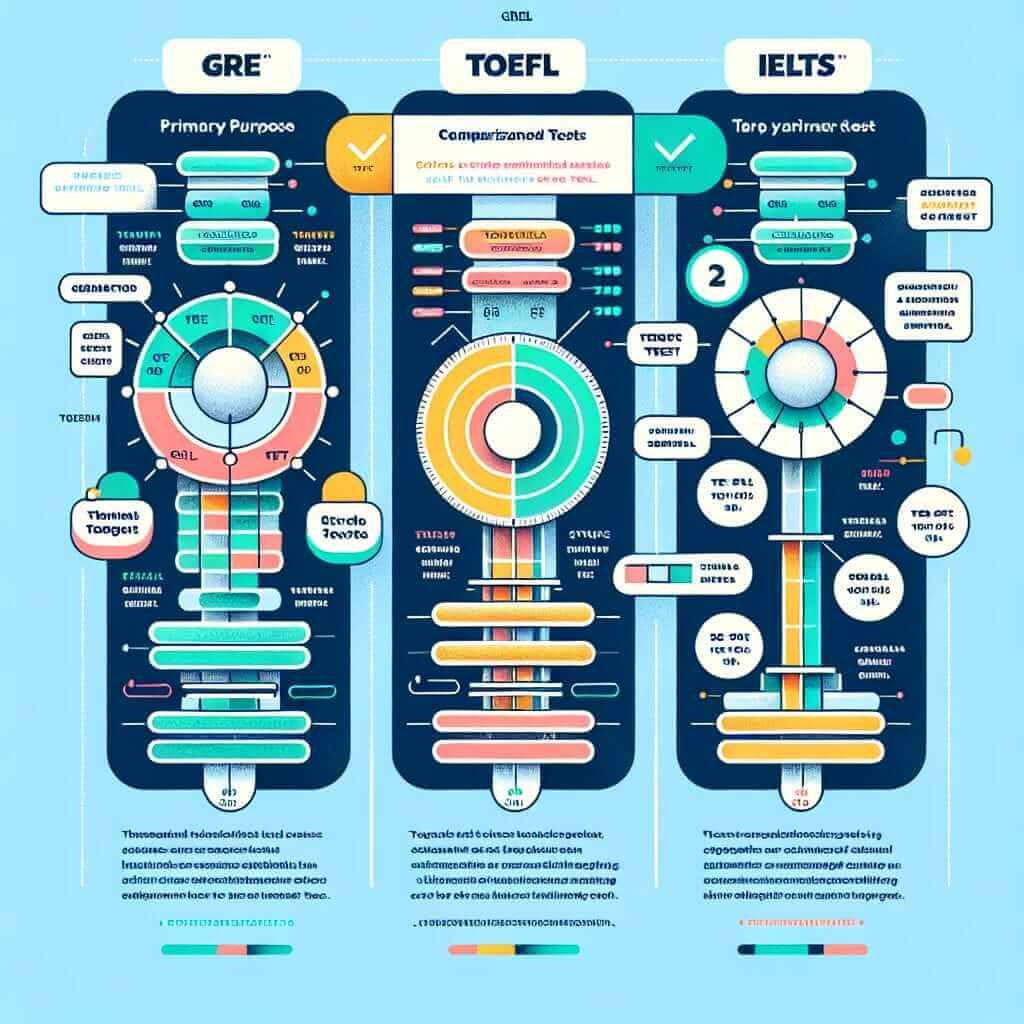As an IELTS instructor with over 20 years of experience, I often encounter students struggling to understand the differences between various English proficiency tests. This confusion is particularly common when comparing the GRE, TOEFL, and IELTS exams. While all three assess your English language skills, they cater to different purposes and academic pathways. This comprehensive guide will delve into the nuances of each test, highlighting their similarities, differences, and ideal candidate profiles to help you make an informed decision.
Understanding the Purpose of Each Test
GRE (Graduate Record Examinations)
The GRE is a standardized test primarily required for admission to graduate programs, particularly in the United States and Canada. While it assesses your English language proficiency through its Verbal Reasoning and Analytical Writing sections, it goes beyond language skills to measure your:
- Verbal Reasoning: Analyzing and evaluating written material, synthesizing information from complex texts, analyzing relationships among component parts of sentences, and recognizing relationships among words and concepts.
- Quantitative Reasoning: Solving problems using basic mathematical concepts and interpreting data presented in various formats.
- Analytical Writing: Articulating complex ideas effectively and supporting ideas with relevant reasons and examples.
Key Takeaway: The GRE is a comprehensive assessment designed to predict your overall academic readiness for graduate-level studies.
TOEFL (Test of English as a Foreign Language)
The TOEFL is specifically designed to assess the English language proficiency of non-native speakers who wish to study or work in English-speaking environments. It focuses primarily on your ability to:
- Reading: Understand academic texts and passages.
- Listening: Comprehend lectures and conversations in an academic setting.
- Speaking: Communicate effectively in spoken English, expressing ideas and opinions clearly.
- Writing: Compose well-organized and grammatically accurate essays on academic topics.
Key Takeaway: The TOEFL is a specialized test that demonstrates your English language fluency across all four communication skills, making it relevant for university admissions and visa applications.
IELTS (International English Language Testing System)
The IELTS, similar to the TOEFL, assesses your English language proficiency for non-native speakers. However, the IELTS offers two testing options:
- Academic IELTS: Designed for those seeking higher education or professional registration in an English-speaking country.
- General Training IELTS: Suitable for individuals migrating to an English-speaking country (primarily Australia, Canada, New Zealand, or the UK) or applying for secondary education, training programs, or work experience.
Both IELTS formats assess your:
- Listening: Understanding a range of spoken English accents and contexts.
- Reading: Comprehending academic or general interest texts.
- Writing: Producing well-structured and grammatically accurate written responses.
- Speaking: Engaging in a face-to-face interview to assess your fluency, pronunciation, vocabulary, and grammatical range.
Key Takeaway: The IELTS offers flexibility with its Academic and General Training options, catering to various academic and professional goals.

Choosing the Right Test: Which One Is for You?
Navigating the decision-making process can be simplified by asking yourself the following questions:
- What is your primary reason for taking the test? (e.g., Graduate school applications, university admissions, visa requirements, professional registration).
- Which test does your chosen institution or organization require or prefer? (Research specific requirements on their official websites).
- What are your strengths and weaknesses in English? (Consider the test format and question types that align best with your skills).
Tips for Success: Preparing for Your Chosen Test
Regardless of the test you choose, thorough preparation is crucial. Here are some valuable tips:
- Familiarize yourself with the test format and question types: Practice with sample tests available on official websites or through reputable test preparation resources.
- Identify your strengths and weaknesses: Focus on areas that require improvement through targeted practice.
- Develop strong time management skills: Practice answering questions within the allotted time frame to build exam-day confidence.
- Seek guidance from experienced instructors: Consider enrolling in a test preparation course or seeking individual tutoring to refine your skills and gain valuable insights.
Conclusion
Choosing the right English proficiency test can significantly impact your academic or professional journey. By understanding the nuances of the GRE, TOEFL, and IELTS exams, carefully considering your goals, and engaging in focused preparation, you can approach your chosen test with confidence and achieve your desired outcomes. Remember, thorough preparation is key to success!